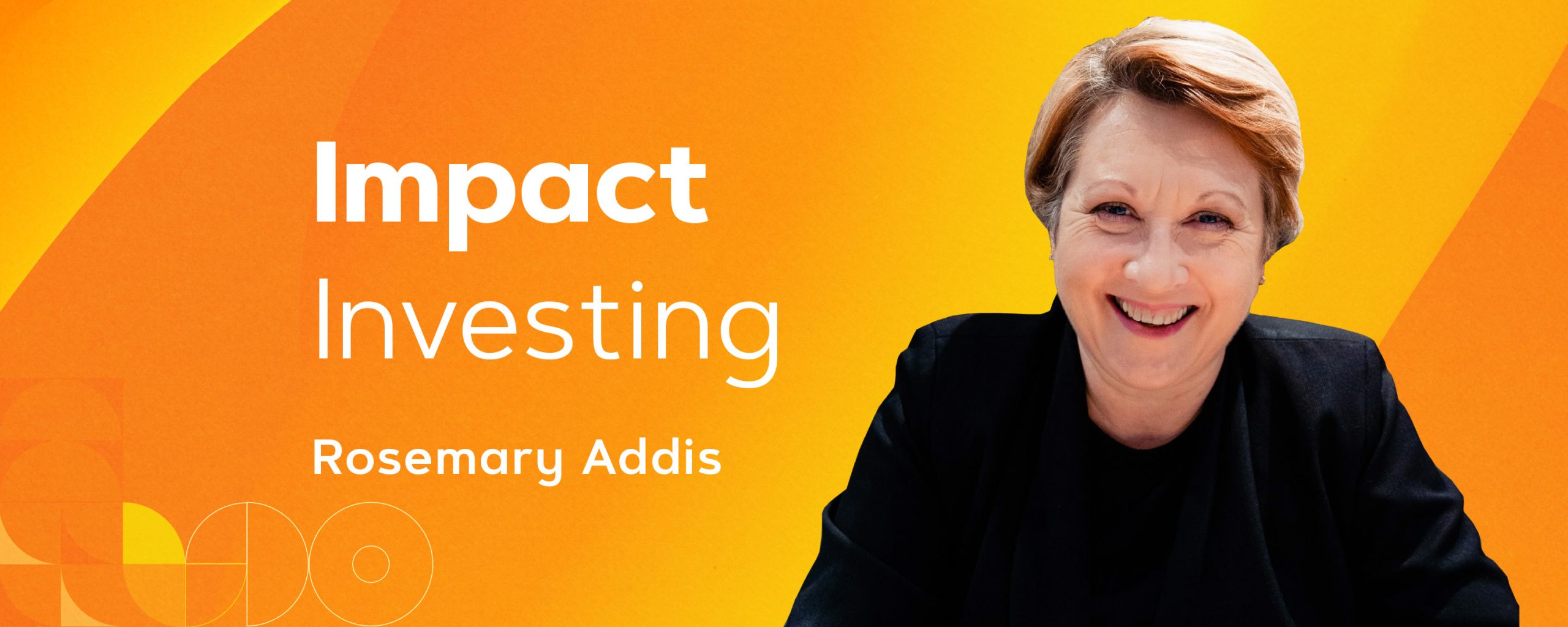Rosemary Addis is the Managing Partner of Mondiale Impact and Enterprise Professor of Impact, Sustainability and Innovation in the Faculty of Business & Economics at the University of Melbourne. We caught up with her ahead of her Summit appearance to chat about how impact investing can help unlock a brighter future.
Rosemary Addis says today’s leaders are standing at the junction of two futures.
The first paints a bleak picture for the future of humanity; where the effects of climate change extend far beyond its environmental impact to cause escalating health risks, food and water insecurity, and amplified inequality and social dislocation.
The second (and, thankfully, much brighter) future is one rooted in impact investing and boils down to a simple choice:
“Are we going to deal with the effects of the systemic issues as they play out and aggregate or are we going to be part of the solution? The choices we make in the next seven to 10 years will really matter to the kind of future we create for our children and grandchildren,” Rosemary says.

Impact at the heart of positive outcomes
Climate change necessitates collective action to address its social implications, build resilience and engage vulnerable populations in shaping the future.
Rosemary says leaders from all sectors play a key role in shaping policies, reducing barriers and directing focus, resources – and capital – towards positive outcomes for people and the planet.
“Capital is a means to and end and is important to achieving better outcomes,” Rosemary says ‘hover, its part of the means to the ends and needs to be directed to move us closer to sustainability goals
Part of directing capital to solutions is impact investing, investments designed to create positive impact for people and the planet and deliver a financial return.
“It’s different from philanthropy in the sense that there is an expectation of financial return and it’s different from traditional ways of investing in that impact is much more in focus, both in terms of the design and the measurement of performance.”
Rosemary says it’s vitally important that government and market infrastructure is designed to support scale in impact investing and make it easier for those organisations wanting to make a positive difference to participate.
“All the work we’ve done to date, reinforced by the findings of the Social Investment Task Force chaired by Michael Trail points to the potential for what could be achieved with a wholesale institution that has the mission mandate capital to help build out intermediaries, so we have funds that are no longer operating subscale and can prove up new models.”
“There are people who have terrific contributions to make but might not have that first mover to go to. A dedicated institution would create a new centre of gravity and provide somewhere to have a much more direct conversation and assessment about how new funds get established and grow and where they might fit within the context of the market,” Rosemary says.
Of course, impact investing is only part of the solution. Given its reliance on current financial and market structures there’s a risk of perpetuating many existing societal problems. Leaders also need to rethink the ‘rules of the game’, those underlying structures, mindsets, beliefs and power imbalances.
The regulatory landscape matters, including removing barriers, with Rosemary citing some of the requirements introduced as part of Your Future, Your Super package as an example of regulatory measures that introduced constraints and made it harder, not easier, for those managing capital at scale to participate.. “Those measures have been a serious hand break on mobilising our institutional capital for longer term outcomes for ESG, for impact, and we need to fix that.”
However, she underscored that we cannot wait for government to act. Impact Investing Australia has catalogued areas where all sectors can contribute.

The power of consumer choice
While leaders and governments have a key role to play in shaping a brighter future, Rosemary said consumers have more power than they realise.
“Everybody’s an investor. If you have any money in the bank, if you have a super account, then you’re an investor. Whether or not you think about yourself buying shares or trading, everybody who goes to the supermarket is affecting the revenue of companies in the products they pick off the shelf,” Rosemary said.
At the end of the day, leadership for impact is about making decisions that avoid harm and contribute to benefits and solutions.
“Wherever you sit, as a consumer or as a board member, it’s about being able to make more informed decisions with confidence so that we can drive more of the activity and the choices people make towards more positive impact.”
And if we consistently make decisions that lead to positive impact, ultimately the outcome is the wellbeing of the people and the planet.
Join Rosemary Addis at the Social Impact Summit on the 3rd and 4th of July.
Last chance tickets are now on sale. To buy tickets or for more information including the event program visit https://socialimpactsummit.co/.
